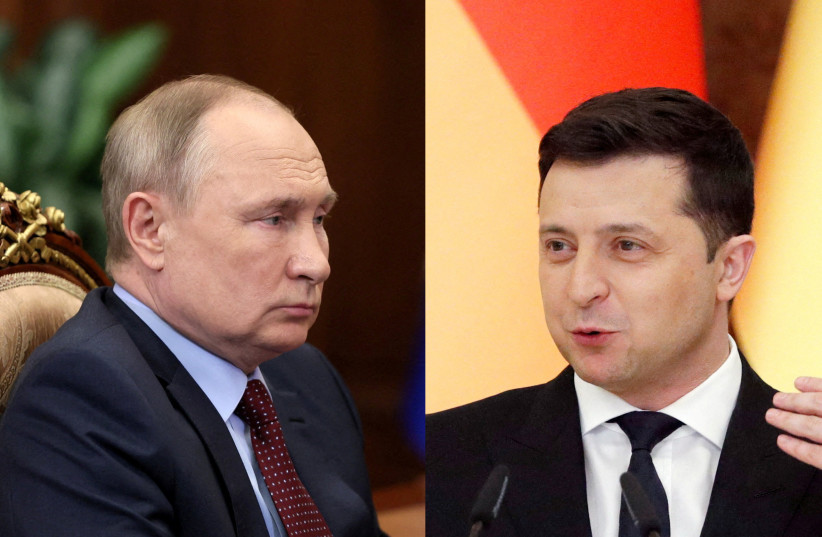Prime Minister Naftali Bennett’s dramatic Shabbat visits to Moscow and then to Berlin were explained as attempts to reach a negotiated ceasefire before the Russian attacks escalated further, causing more death and destruction in Ukraine. Bennett was cast in the role of mediator and peace-broker, uniquely able to talk to both sides, Russian President Vladimir Putin and Ukrainian President Volodymyr Zelensky. His efforts were reportedly coordinated with the United States government, as well as with German Chancellor Olaf Scholz (who had visited Jerusalem a few days before) and French President Emmanuel Macron.
For many commentators and analysts, the undertaking was heroic and placed Israel among the top echelons of international power brokers. Some noted the chasm between the NGO- and UN-led campaigns to isolate Israel as a leper through the label of apartheid on the one hand and the high-flying status of a global peacemaker on the other. Surely, this was a major upgrade in both Bennett’s own domestic political image and that of Israel around the world, with additional benefits regarding other Israeli interests, including stopping the Iranian nuclear program.
But, there is another interpretation that seems more plausible and less appealing, which rests on the fundamental distinction between a mediated peace agreement and unilateral surrender. Putin’s actions reflect a carefully planned and executed strategy of systematically pounding and terrorizing Ukrainian cities, one by one. His objectives, in terms of confronting the US and NATO by demonstrating Russian strength and destructive power, were clearly and repeatedly stated. The surrender by Zelensky and Ukrainian forces, and the imposition of a puppet government run out of the Kremlin would mark the achievement of those objectives.
If Putin is using Bennett as a passive messenger to convey these terms of surrender to Zelensky, the European leaders, and the Biden administration, this would be far removed from the actions of an active mediator and peace broker. A mediated agreement, beginning with a ceasefire, consists of mutual concessions – both sides give up something significant for the sake of peace and an end to destruction. The core job of the mediator in such circumstances is to help facilitate the terms for this transition and then an agreement, including providing a communications channel when the two parties are not speaking to each other.
In many other cases, the mediator is more actively involved, proposing creative options to overcome stalemates and providing security or other guarantees. To end the 1973 Yom Kippur war, the US (Kissinger’s shuttle diplomacy) brokered a ceasefire, which included an American monitoring force, and was a form of pre-negotiation. A few years later, during the historic negotiations between Egyptian President Anwar Sadat and Israeli Prime Minister Menachem Begin that led to the 1979 treaty with Egypt, when a third-party was needed, the US government facilitated the Camp David talks, as well as side payments in the form of substantial economic and military aid to both sides. The Americans also helped overcome a major obstacle by guaranteeing Israel’s access to oil in exchange for withdrawal from the petroleum fields in the Sinai.

In the case of Russia and Ukraine, Israel has little to offer beyond the communications channel. Jerusalem has no real power or leverage and is not in a position to act as an economic or security guarantor for either side. Though it is possible that Putin, like other leaders far removed from the realities of US-Israel relations, subscribes to the myth of exaggerated Israeli and Jewish influence in Washington.
Another condition usually required for successful mediation during a conflict is known as ripeness, referring to the condition in which both sides have suffered enough, and any further gains through additional fighting appear to be lower than the likely costs (a mutual hurting stalemate). The relationship between the warring parties shifts from zero-sum (one side’s gain is the other’s loss) to win-win (both benefit). In the War of Independence and the Yom Kippur War, mediators were able to broker armistice agreements when this stage was reached. In contrast, in the absence of ripeness, when at least one side seeks to use the facade of negotiations to prepare for more attacks, the would-be mediator is also blamed, as in the case of Yasser Arafat and Norway during the infamous Oslo Accords.
In the Russian invasion, there is no clear evidence of ripeness or a transition away from a zero-sum conflict, as the conquest and destruction in Ukrainian cities continues. While there are many claims and videos of successful Ukrainian counter-attacks, it is difficult to separate the disinformation from reality. It is possible that the Ukrainian resistance and level of Russian casualties is more than Putin had planned on, and the same for the Western economic sanctions, but this is entirely speculative.
For these reasons, a darker scenario cannot be excluded, in which Putin is using Israel and Bennett more as a messenger to communicate and press his terms for total surrender, rather than as a third-party mediator, facilitator and peace broker. While optimism is important, particularly amidst terrible destruction, it needs to be tempered by cold realism.
The writer is emeritus professor and founder of the Program on Conflict Management and Negotiation at Bar-Ilan University, and heads the Institute for NGO Research. His book, Menachem Begin and the Egypt-Israel Peace Process, was published in 2019.
